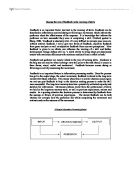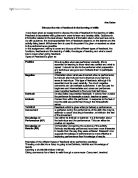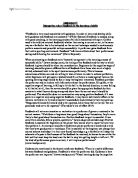Extrinsic Feedback-Verbal or visual, not coming from the performer of the skill e.g. coach. Video recording‘s useful to senior athletes to see what’s wrong and how to improve it. Extrinsic can be a mix e.g. a trampolining coach gives positive feedback at the end of a routine - also making it terminal. They may tell the athlete they aren’t using their arms and hips when attempting swivel hips. This would increase gross body involvement of the skill on the continuum as more muscles are involved for improvement. The feedback’s negative as it picks out faults for improvement.
Positive Feedback encourages by highlighting positives of the performance. It boosts morale and gives the performer confidence in their sport, often used with beginners. Knowing what was correct identifies the correct technique for repetition.
Negative Feedback - taken as constructive criticism to identify mistakes and learn the correct technique, or demoralising information for the athlete. Experienced performers take it constructively for improvement as being excellent is not perfect. However a beginner needs positive; too much negative will de-motivate.
Knowledge of Results (KR) usually extrinsic and comes at the end of a performance. Statistics are often involved e.g. scoring in gymnastics. However, in 800m the split lap’s called telling the athlete if the split is too slow. The skill becomes externally paced rather than in the middle of the pacing continuum (due to other runners around you etc.) To pick up the pace and to run the model Kelly Holmes “even paced race”, the athlete has to speed up to win/set a PB.
Knowledge of Performance (KP) - extrinsic or intrinsic. E.g. intrinsic:
When bouncing on a trampoline perceptual skills inform you aren’t bouncing on the cross altering your position therefore improving performance. Alternatively the coach says the arms were bent during a front drop which causing a technical fault - extrinsic. Cognitive skills are now developed because if this was the only fault with the skill, the athlete would become associative with it. Focus can be on straighter arms. At the same time perceptual skills would improve due to landing on the cross.
Recent research shows that although performers favour KR over KP, KP is more effective in improving performance; includes negative feedback i.e. recognising technical/tactical mistakes allows improvement. Also KR may not reflect the performance e.g. a football team win 3-1 but their opponents were better for 80 minutes of the match.
Terminal Feedback comes at the end of the performance in a clear and constructive manner. The athletes can reflect on their performance and concentrate on the feedback. However terminal can also come before a performance based on prior performances.
Concurrent Feedback is that which is received during the performance of the skill. It can either be extrinsic or intrinsic e.g. a coach shouting information from the sidelines or the kinaesthetic feel gained throughout the skill.
These types of feedback are suitable to athletes of different abilities. Phases of learning are cognitive (beginner), associative (intermediate), and autonomous (expert). Cognitive phase requires mainly KR and positive feedback, encouraging the athlete and increasing confidence. Terminal KR means the athlete can give full attention to their performance with proof of mistakes and successes. Negative may demoralise, concurrent may complicate physically performing the skill. Visual and manual guidance is necessary as visual provides an image in the mind to replicate whilst manual reduces the injury risk and teaches the absolute basics e.g. holding a tennis racket.
Information is more important at associative phase because schemas become more complex, allowing natural completion of skills. Athletes can take in more information whilst performing (extrinsic and concurrent). The kinaesthetic feel for the skills becomes more prominent so intrinsic is understood. Negative’s now necessary to highlight mistakes but positive’s still needed as not to ignore completion of good skill. Guidance can be verbal and visual together as visual imprints already exist. Manual and mechanical aren’t helpful as basics have been mastered unless learning a new complex skill such as a stick stop from a penalty corner in hockey. (Hand position on the stick involves new fine skills than a normal stop which contains more gross skills at the opposite end of the body involvement continuum, as the legs and arms must be bent and in isometric contraction in anticipation stance for the ball. Fine skills also require terminal feedback as they must be controlled and accurately taught, not practised till the player has formed an incorrect technique.
Guidance is similar to associative at autonomous phase and intrinsic becomes the most important form of feedback for the same reasons as associative. However schemas are more complex from experience. There is no conscious thought whilst performing and the skills are perfect which results in model technique and execution. E.g. an autonomous hockey player has open skills when dribbling because they are always conscious of the opposition and the need to attack.
In conclusion, feedback is essential to the learning of skills if the skills are to be learnt correctly. It motivates athletes and helps promote learning by developing a link between stimulus and response. There are various types of feedback most useful for different athletes according to age, ability and reason for participation:
Cognitive phase athletes depend on positive feedback and lots of guidance in order to gain confidence, whereas associative and autonomous phase athletes depend on negative and intrinsic feedback in order to perfect their performance. Through negative feedback mistakes can be identified and improved upon by the development of the schema.







